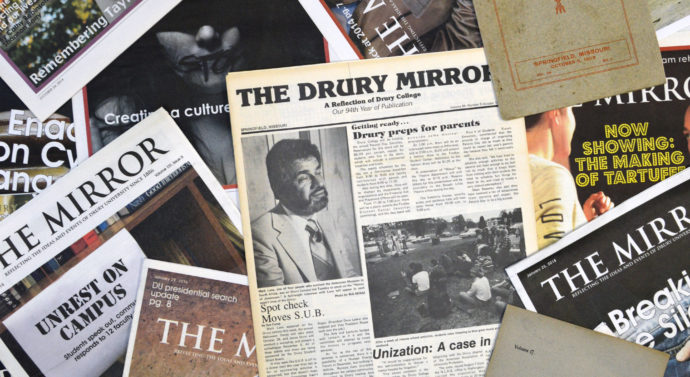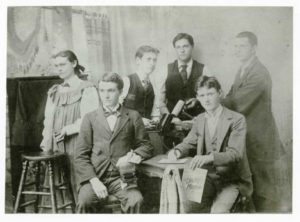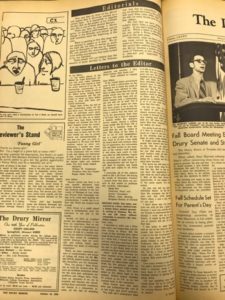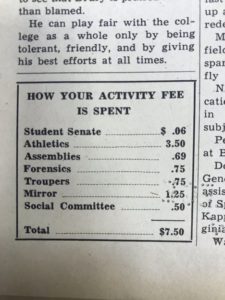
Since 1886: The legacy of The Mirror
Front Page November 30, 2018, Comments Off 109*Note this story contains an expletive. The Mirror chose to publish this term due to its contextual and historical importance within the story. The Mirror very rarely publishes expletives, only when the use of such specific language is crucial to the story. Please contact mirror@drury.edu with any questions or concerns.
Since its founding in 1886, Drury University’s student-run newspaper, The Mirror, has published an issue nearly every week about issues and events affecting the student body and the Springfield community. Over the years, The Mirror has been part of many remarkable stories. Some have been written and published in pages of past editions and others took place “off the record.” Either way, these stories of The Mirror have persisted over the past 130 years.
William Garvin is Drury University’s archivist. Garvin maintains the library’s rare books collection and preserves original copies of The Mirror, dating back to the newspaper’s inception. He has a vested interest in the newspaper and takes time to examine its past in order to understand Drury’s history.
“When you go back and look at some of the early editions, from the ‘40s, there are some very well-written pieces. The standard was very high. There were even times when the paper was very controversial,” Garvin revealed.
The Mirror’s link to the Titanic

Hurd is holding the copy of The Mirror. Photo via William Garvin.
One long-forgotten tale of The Mirror is that of Carlos Hurd, a Drury alumnus who was editor-in-chief of The Mirror during his time here.
Hurd was responsible for breaking the story of the Titanic’s sinking.
At the time of incident, Hurd was a passenger on a different ship, the Carpathia, traveling with his wife on a month-long European vacation. A reporter for The St. Louis Post-Dispatch, Hurd’s story made it to print only because of a combination of three things: sheer luck, connections and his true heart for journalism.
The Post-Dispatch was one of many Pulitzer-owned papers. Hurd had met with Pulitzer himself and the editor of The New York Times the day before he left for Europe. Early on in the second day of his voyage overseas, the ship’s engines shut off. Wanting an explanation, Hurd went to the deck to investigate.
Garvin described the exchange: “He catches a crewman running by and asks what’s going on. The crewman replies, ‘It’s the Titanic, sir. She’s at the bottom of the ocean.’ So he [Hurd] springs into action.”
Stashed story releases the secret of the Titanic
The Carpathia took in many survivors of the Titanic. Hurd interviewed as many survivors as he could, all while avoiding the captain and the declared news blackout intended to prevent the story from getting out.
“Pulitzer and his editor are frantically trying to get ahold of Hurd…But the captain of the ship, Rostam, will not let these get through. He shuts down the telegrams to and from the boat,” continued Garvin.
When the captain ordered all stationery to be confiscated from the passengers, Hurd’s wife hid his writing underneath the sheets of her bed and sat on them to prevent them from being taken.
When the Carpathia pulled back into the ports of New York to get the Titanic survivors to shore, crew members searched the passengers as they disembarked in order to keep anything from reaching the news. Boats filled with members of the press crowded the harbor, each hoping to be the one to get the first scoop on the tragedy.
Hurd ingeniously avoided his writings from being confiscated. He hid his story in a cigar box, sealed it shut with candle wax, and stuck champagne corks on the length of wire wrapped around the box. The cork was to allow the box to float through the sea to shore, hopefully to avoid detection by a crew member. However, one crew member noticed: “There’s a guide wire coming down and the box hits it. It falls to the deck of the Carpathia,” Garvin stated. “A crewman picks it up and looks at it. Pulitzer’s editor on the boat shouts, ‘Sir, throw it to me!’ And, for whatever reason, he [the crewman] does.”
This fascinating story seems like a legacy of Drury and The Mirror that would be hard to ignore; yet, it has been mostly forgotten through the 109 years since the tragedy of the Titanic.
“This story of a journalist who worked against all odds to get this story out, this used to be taught as a case study of how ‘this is how it’s done.’ And a lot of people who work at The Mirror don’t even know who he is,” Garvin lamented.
Freedom of press, Freedom of speech and censorship
While The Mirror and former Mirror writers have covered hard-hitting, internationally-significant stories such as Hurd’s, The Mirror is – at its heart – a record of Drury University and Drury students who have their own incredible tales to tell.
During the Vietnam War, The Mirror published a letter written home by a former Drury student. The letter included the word “fuck,” which was not edited out.
“It was a very candid letter written to a friend that described what it was like to be a soldier. It was pretty grim, not very patriotic, but told it like it was,” shared Garvin. “They dropped the f-bomb in it.”
Drury’s Board of Trustees leapt on the paper for allowing the word to be published, which was a fight that continued for months – and which The Mirror documented as it battled for its right for freedom of speech.
“So here’s this battle: You’re trying to teach students the values of free press, but you’ve got people going to the trustees demanding they do something about this,” Garvin detailed wryly.
The Mirror proved that Drury was not a place to remain passive.
During the same era, the paper released a blank issue as a how-to guide for putting articles together as a form of protest against the war.

Personals. Photo via William Garvin.
The Mirror: Both controversial and fun, throughout the ages
The Mirror has also had its lightheartedness. Stefanie McCall, a 1993 graduate of Drury and a former Mirror writer, recalls a time when The Mirror published a kind of “personals” section.
“It was this section that students submitted to,” said McCall. “You could write to your crush, your girlfriend, your best friend, your enemy. You could put down a little inside joke, just whatever you wanted.”
The paper also published cartoons each week. This one demonstrates that history truly does repeat itself.
When McCall wrote for The Mirror, staff writers were not paid. Instead, volunteers received one elective credit per semester.

Cartoon. Photo via William Garvin.
“If you liked writing and wanted to fill your schedule, you could just sign up to write for the paper,” McCall laughed.
Even here on our small campus, however, there has always been controversy surrounding The Mirror.
“Something that stood out to me that I still remember,” said former student and Drury parent Juliet VonAllmen, “is a five-part series The Mirror did about Drury’s relationship with Central High School. At the time, Central was pretty rough-and-tumble, while Drury was seen as more classy, maybe a little snobby. Some people didn’t like the idea of telling people that this private college and troublesome public high school rubbed elbows.”
The series on Central High School proved to be a heartwarming one in the end.
The Mirror has had a lasting impact on students who used to read it during their time at Drury.
“I feel the Drury Mirror has a lasting tradition of providing information to its readers that enlightens minds and improves readers’ understanding of many viewpoints,” said VonAllmen. “This helps readers understand the world around them and understand themselves. The Mirror has improved upon this tradition from what I have read the last year and a half from when I was a Drury student.”

Photo via William Garvin.
The slow, sad death of print journalism
The Mirror has faced challenges in the 21st century. A decline in people reading print newspapers has led to budget cuts in recent years. While newspapers may be a dying art, The Mirror has shown willingness to adapt to an ever-changing world by integrating an online edition. The spirit of journalism lives on at Drury, regardless of its format.
The Mirror is part of a legacy that is rooted in Drury’s earliest years. Working for The Mirror is more than just a campus job, resume builder or another line to add on one’s email signature. By reflecting the values and events of Drury, The Mirror documents and shapes the university, and it will continue to do so for many more decades.
Written by Maclen Johnson and Forest Swisher.